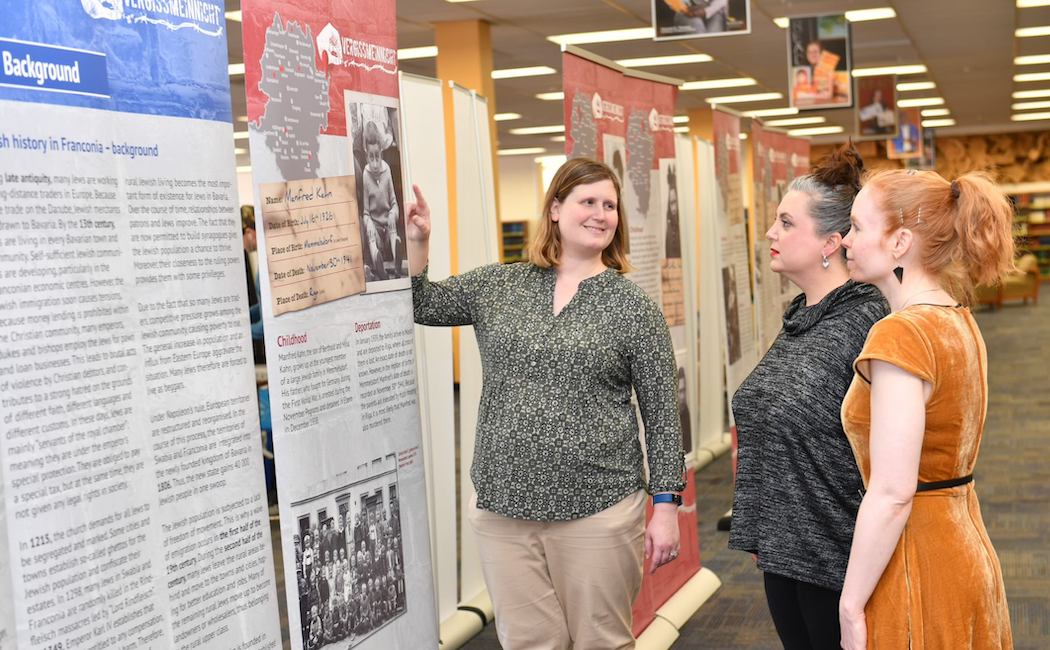TU to host virtual symposium on teaching about the Holocaust amid digital disinformation
Event will feature top Holocaust educators from across the world
By Kyle Hobstetter on February 17, 2022

In a 2020 survey conducted by the Claims Conference, more than 25% of people between ages 18–39 believe that the Holocaust either didn’t happen or has been exaggerated.
Surveys like this one showcase the alarming amount of racism, antisemitism and disinformation being presented to the generation that grew up in the digital age.
That’s why Joyce Garczynski, assistant university librarian for development and communications in the Albert S. Cook Library, and Hana Bor, professor and graduate program director in the Department of Family Studies & Community Development, are hosting an event that helps educators fight disinformation when teaching about the Holocaust.
The two will serve as moderators during Evidence Against Intolerance, a virtual symposium on Wed., Feb. 23, from 9 a.m. – 5 p.m.
Those interested must register and will receive a link to the symposium within 24 hours of registering.
After looking at the results of surveys and doing her own research, Garczynski wanted to not only bring Holocaust educators together but include librarians who specialize in information literacy.
“We want to teach students how to be critical thinkers and evaluate the information they come across,” Garczynski says. “So, we thought we could bring together these two communities, who have a vested interest, and start a conversation on how to fix these problems.”
“This symposium comes at a perfect time to raise awareness and start a serious dialogue about racism and intolerance,” adds Bor. “We live in a time where around the world there is a major rise in antisemitism. We don’t want to believe it, and we don’t want to talk about it.
“I think doing a symposium on Holocaust education, specifically in an age full of disinformation, is important. Not just for Jewish people, but for everybody.”
The symposium will feature four panels, with topics including:
- State of Holocaust education
- Resistance, rescue, victims, survivors and heroism
- Information literacy and Holocaust education resource sharing
- Holocaust denial, antisemitism and hatred in the modern area
More Information: Meet the entire list of speakers for the symposium
The event will also have a breakout room moderated by graduate students from Bor’s class and Garczynski’s office.
Judith Tydor Baumel-Schwartz, the director of the Arnold and Leona Finkler Institute of Holocaust Research and a professor at the Israel and Golda Koschitsky Department of Jewish History and Contemporary Jewry at Bar-Ilan University in Israel, will be the keynote speaker.
Her talk is titled, “Teaching the Holocaust in this Contemporary Climate.” For Bor and Garczynski, that sums up what they are hoping attendees take away from the symposium.
“The Holocaust is something we can look at and learn from,” Bor says. “We want people to leave the symposium with open-mindedness, more tools and more knowledge and wanting to make a difference and continue the conversation.
“Towson University is good about encouraging diversity, and I think this will fit right in and allow us to continue to talk about diversity and tolerance.”
The symposium was made possible by a grant from the Towson University Foundation as well as:
- Albert S. Cook Library
- The Arnold and Leona Finkler Institute of Holocaust Research, Bar-Ilan University
- Baltimore Hebrew Institute
- Baltimore Jewish Council
- Center for Jewish Education
- Jewish Museum of Maryland
- The Rabbi Mark G. Loeb Center for Adult Learning
- Towson University CLA Diversity & Inclusion Committee